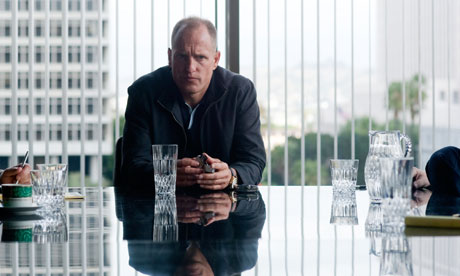
The dirty LAPD cop is a much love-hated figure in American cinema, in movies like Internal Affairs, LA Confidential and Training Day. (Abel Ferrara's Bad Lieutenant works in New York, but has a kind of honorary LAPD status in this murky context, along possibly with Jack Nicholson's Colonel Nathan Jessup, handling the truth in A Few Good Men.) The corrupt officer is traditionally cynical, unrepentant, menacingly affable, perhaps brooding over retirement. His glowering sense of survival in the Los Angeles street wars is flavoured with gruff self-satisfaction and self-pity, and he could well feel the need for one last brutal gesture of self-worth in mentoring or ethically deflowering some naive young rookie.
James Ellroy's script for Rampart, brought to the screen by director and co-writer Oren Moverman, shows an irredeemably filthy LAPD officer, Detective David Brown, played by Woody Harrelson. He is a lawman who is a law unto himself. We see him in 1999, the end of the century and the bitter end of a tarnished golden age of being a corrupt cop in that city. The title, as well as connoting our hero's paranoid defensiveness, refers to the Rampart police division of downtown Los Angeles, which in the late 1990s was the centre of a sensational scandal. Officers were found to be deeply involved in drug crime and robberies. Perhaps the nearest British equivalent is the Obscene Publications Squad, or "Dirty Squad" in London's Soho in the 1970s, a group of police so corrupt that they effectively co-owned and co-managed the porn business with the pornographers themselves.
Harrelson's crooked cop is first seen in a classic pose: that open, almost country-boy face is closed off, hidden behind aviator shades as he cruises the streets in his squad car. In this opening scene, we are treated to an excruciating moment as Brown indulges in the pure, pointless bullying of a young female officer. He has bought her a burger and fries for lunch; she has accepted, clearly out of cowed politeness, and then he demands she eat up all the fries she didn't want. Ellroy shows that in precisely the same spirit of cruelty, resentment and boredom, Brown demonstrates to this younger colleague how to intimidate groups of Latino guys huddled on street corners by driving straight at them, siren blaring – and then notice where they are running.
Brown is plying his trade in the era of Rodney King and OJ Simpson, when police tactics and the race war became a painful national issue: he himself beats the hell out of someone evading arrest and an amateur video finds its way on to the nightly news. This of course was an era before videocameras were commonplace on mobile phones and before YouTube. The video's appearance is sensational; Brown figures it is too convenient and suspects he is being set up by his department and the city establishment to draw heat away from the "Rampart" scandal. Sigourney Weaver and Steve Buscemi have cameos as harassed authority figures intensely embarrassed by Brown's behaviour. He refuses to apologise or take early retirement; instead, Brown stays sharp by mixing pills and booze, and retains a lawyer whom he intends to pay with a captivatingly horrible plan of pure evil that puts him further into the mire. Meanwhile, his domestic imbroglio – living with two sisters, played by Anne Heche and Cynthia Nixon, with whom he has had a daughter each – becomes a nightmare as he realises that this is a household made up of women who hate him. Just to nettle Brown, his daughter calls him by his station-house nickname, "Date-Rape", a handle he allegedly earned by killing a violent date-rapist (a classic Ellroy trope).
Rampart is an involving and tense study of a long, slow, agonising endgame; scenes from a life in denial and descent. Brown sometimes defiantly threatens to take his bar exams, so the city can hire him as their "token fascist", and also fantasises about a court case in which he would defend himself, tell the truth, lose, but get a job on Fox News – and some of the fascination and poignancy of the film is that this is almost plausible. He has in any case become used to the idea of police work as cold war, an armed neutrality with repeated skirmishes, in which the LAPD and gangs claim Los Angeles in the way Pakistan and India claim Kashmir. Collaboration and accommodation with the enemy must occasionally be made: payoffs and contacts and off-the-record hits are acceptable in order to prevent a larger catastrophe, and this is all part of the martyred "dirtiness" of the job. In a resentful, mutinous spirit very like Brown's, Clint Eastwood's Inspector Harry Callahan once explained how he got his nickname: he gets "every dirty job that comes along".
There is an acrid, pessimistic, despairing wit in Rampart sometimes, especially when Brown reveals his specious fluency in legal casework, easily coming up with a legal precedent that justifies the latest brutality – which he may or may not have made up. Perhaps this nightmare can still end in some kind of deal for Brown. But it is when he has to face the incomprehension and contempt of his children that the blank despair shows on Harrelson's face. Rampart is a gripping movie, and a great addition to the Ellroy canon.

